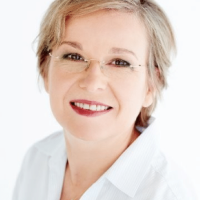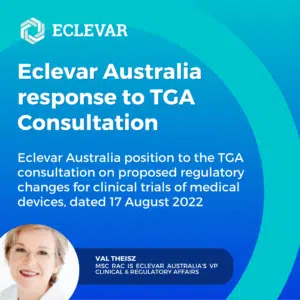Eclevar Australia response to TGA Consultation on proposed regulatory changes for clinical trials of medical device – 17 August 2022
TGA is seeking feedback on two proposed changes to the regulatory framework for clinical trials: a CTA mandate and GCP inspections for clinical trials for medical device
In August 2022, the Australian Therapeutic Goods Administration (TGA) invited feedback to a public consultation on proposed regulatory changes for clinical trials of medical devices.
The proposed changes are:
- Mandating clinical trial approval (CTA scheme) for clinical trials of high-risk, novel medical devices
- Introducing a Good Clinical Practice Inspection Program (GCPIP) for clinical trials of medical devices
Currently, the clinical trial sponsor chooses whether to send a clinical trial notification (CTN) to the TGA via the CTN scheme, or whether to submit an application for clinical trial approval (CTA) via the CTA scheme. As expected, there were no CTA application in the past 5 years. Of the 120-210 medical device clinical trials that have occurred every year during this time, all went through the CTN pathway. All clinical trials are required to obtain an Ethics Committee approval before starting. For the small Australian market (less than 3% of the global market for medical devices), not having to apply for TGA approval in addition to the Ethics Committee approval represents a commercial advantage compared to other established jurisdictions such as the EU and the U.S.
Similarly, a GCPIP for clinical trials of medical devices will almost certainly increase the cost of running clinical trials in Australia. Clinical trials of medical devices are already legally required to comply with the standard ISO 14155 Clinical investigation of medical devices for human subjects — Good clinical practice. This GCP standard covers the entire cycle of a clinical trial, including requirements for monitoring, adverse event reporting, quality assurance, and auditing.
The consultation is asking stakeholders to answer two questions:
- Do you think the TGA should have more oversight of clinical trials involving high-risk medical devices (i.e., invasive or implantable medical devices that have not previously been approved for use in people)?
- Do you think clinical trials of medical devices should be included in the existing GCP Inspection Program?
We have looked at the existing regulatory environment for clinical trials of medical devices. Every State and Territory has its own requirements, processes, and documentation for obtaining Human Research Ethics Committees (HREC) approvals. A multi-centre clinical trial would almost certainly need to recruit patients from across Australia, a laborious and duplicative exercise if a clinical trial needs to go beyond one State or Territory.
The most recent attempt at national harmonization, the National One Stop Shop (OSS) and the National Clinical Trials Front Door platform for health-related human research, an initiative of the Australian Commission on Safety and Quality in Health Care (ACSQHC), is still ongoing with no fixed deadline in sight. Any additional layers of submissions and approvals for clinical trials should not be considered before implementing a national harmonization of HREC submissions and approvals.
The TGA estimates that less than 10% of device clinical trials, i.e., 20 or less per year that would fall under the “novel, high risk” category, would be required to submit a CTA. However, the consultation paper providesre is no additional clarification on exactly what “novel” means in this context. Most medical devices are incremental improvements of existing devices and hove some degree of novelty. A completely “novel” device is one that encompasses technology never used in humans before for a specific indication, Completely “novel” could also mean using existing technology for a novel clinical application.
Premarket clinical trials are typically required for higher risk devices (implantable and Class III) and for devices with greater novelty. So, the question is which pathway is more appropriate for a particular clinical trial, a CTN or a CTA?
Has the CTN scheme proven to be insufficient for overseeing clinical trials in Australia? Not according to publicly available data. There haven’t been any life-threatening failures involving novel, high-risk devices notified via the CTN scheme. Certainly not comparable to that of the Phase 0 trial of TGN1412 monoclonal antibody run by Parexel in 2006. A regulatory approval by the UK regulatory did not prevent the 6 out of 8 patients who were administered the TGN1412 drug to experience catastrophic effects in minutes.
Traditional feasibility and pivotal clinical trials for me-too medical devices (well-characterized technology, established intended use) could continue to be notified via the CTN scheme, as before.
Medical devices with greater novelty would typically require a first in human (FIH) clinical investigation or an early feasibility clinical investigation.
- An FIH clinical investigation is defined as “A clinical investigation in which a medical device for a specific indication is evaluated for the first time in human subjects.” (ISO 14155:2020, cl. I.5.2)
- An early feasibility clinical investigation is defined as “A limited clinical investigation of a device early in development, typically before the device design has been finalized, for a specific indication (e.g., innovative device for a new or established intended use, marketed device for a novel clinical application). It can be used to evaluate the device design concept with respect to initial clinical safety and device clinical performance or effectiveness (if appropriate) as per intended use in a small number of subjects when this information cannot practically be provided through additional nonclinical assessments or appropriate nonclinical tests are unavailable. Information obtained from an early feasibility clinical investigation can guide device modifications. An early feasibility clinical investigation does not necessarily involve the first clinical use of a device.” (ISO 14155:2020, cl. I.5.3)
Although the U.S. FDA uses the same definitions for FIH study and early feasibility study in its Guidance: Investigational Device Exemptions (IDEs) for Early Feasibility Medical Device Clinical Studies, Including Certain First in Human (FIH) Studies, October 1, 2013, it also states that “This document [FDA guidance] only discusses FIH studies that meet the definition of an early feasibility study.” This additional statement clarifies that FDA considers FIH studies for medical devices to be early feasibility studies as well, i.e., applicable to innovative devices for a new or established intended use, and to marketed devices for a novel clinical application. Such a clarification cannot be found in the consultation paper or the existing Australian clinical trial handbook, and neither in the ISO 14155:2020 standard. It follows that FIH and early feasibility clinical investigations would be more suitable for CTA applications, and they could also be incorporated in a Priority Review application for novel medical devices.
Regarding GCPIP, the TGA estimates that only 10-15 medical device clinical trials per year would undergo CGP inspections by the TGA. These would be selected based on risk factors such as whether the clinical trial is for a FIH device, safety record of similar products, the experience of the group conducting the trial, and the compliance record of the group undertaking the trial.
The National Clinical Trials Governance Framework, also developed by the ACSQHC, already provides a framework for accreditation of clinical trial sites, according to Australian and internationally accepted standards. The consultation paper does not mention this framework at all, and it is not clear whether the TGA has considered whether adding GCP inspections would duplicate the ACSQHC accreditation scheme for clinical trials.
Eclevar Australia supports best practice in the conduct of clinical trials that ensures safety and protection of human subjects without unnecessary layers of bureaucracy that may negatively affect the attractiveness of Australia as a destination for clinical research and innovation.

VAL THEISZ
MSC RAC IS ECLEVAR AUSTRALIA’S VP CLINICAL & REGULATORY AFFAIRS
Val Theisz has been Principal Consultant, Co-founder and non-executive Director, Certification Body Australia
Val is a regulatory affairs professional with over 15 years of experience in medical devices of all risk classes, including life-sustaining, high-risk active implantables, and software as medical devices (SaMD) using Artificial Intelligence (AI) algorithms. Val has a Masters degree in electrical engineering and holds Regulatory Affairs Certification credentials for EU and US regulations (RAC EU, RAC US) from the US- based Regulatory Affairs Professionals Society (RAPS).
Val’s experience within the field covers clinical trials for high-risk innovative medical devices; submissions and pre-market approvals in established markets (CE Marking, FDA 510(k) and PMA, TGA registration). Val has also been the Director of Regulatory & Clinical Affairs, Code of Practice with the Medical Technology Association of Australia (MTAA), leading industry advocacy initiatives with the Therapeutic Goods Administration and the Australian Department of Health.

